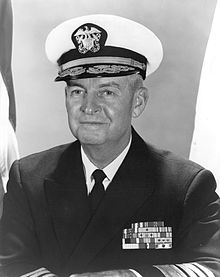U. S. Grant Sharp Jr.
| U. S. Grant Sharp Jr. | |
|---|---|

Ulysses S. Grant Sharp Jr.
|
|
| Birth name | Ulysses Simpson Grant Sharp Jr. |
| Nickname(s) | Oley |
| Born |
April 2, 1906 Chinook, Montana |
| Died | December 12, 2001 (aged 95) San Diego, California |
| Buried | Fort Rosecrans National Cemetery, San Diego |
| Allegiance | United States |
| Service/branch | United States Navy |
| Years of service | 1927–1968 |
| Rank | Admiral |
| Commands held |
United States Pacific Command United States Pacific Fleet United States First Fleet USS Boyd |
| Battles/wars |
World War II Korean War Vietnam War |
| Awards |
Navy Distinguished Service Medal (2) Army Distinguished Service Medal Silver Star (2) Bronze Star Medal (2) Navy and Marine Corps Commendation Medal (3) |
Ulysses Simpson Grant Sharp Jr. (April 2, 1906 – December 12, 2001) was a United States Navy four star admiral who served as Commander in Chief, United States Pacific Fleet (CINCPACFLT) from 1963 to 1964; and Commander-in-Chief, United States Pacific Command (CINCPAC) from 1964 to 1968. He was PACOM commander during the Gulf of Tonkin Incident. Sharp was related to Ulysses S. Grant, who married Sharp's great-aunt.
Sharp was born in Chinook, Montana, and named for Ulysses S. Grant, who was married to his grandmother's sister. Raised in Fort Benton, Montana, he graduated from the United States Naval Academy in 1927. He is also a 1950 graduate of the Naval War College.
During World War II, he commanded the destroyer USS Boyd in the Pacific Theater, earning two Silver Stars. By the Korean War, he was commanding a destroyer squadron, assisting in the planning of the Inchon landing. He served as deputy chief of naval operations for policy and planning in the early 1960s.
After receiving his fourth star, Sharp took command of the Pacific Fleet in 1963, followed by command of Pacific Command. During his tenure, due to the Tonkin Gulf Incident, the U.S. increased its presence in Vietnam after the passage of the Gulf of Tonkin Resolution. Sharp's views on U.S. strategy in the war, namely massive military action, differed sharply with the Johnson administration's preference for a gradual buildup of forces. Sharp was featured on the August 14, 1964, cover of TIME Magazine.
After retiring from the Navy, Sharp was a critic of U.S. policy in the Vietnam War, lecturing frequently and writing articles. He wrote an article in Reader's Digest in 1969 titled We Could Have Won in Vietnam Long Ago, and in 1978 his book Strategy for Defeat: Vietnam in Retrospect was published.
...
Wikipedia
